300th Anniversary
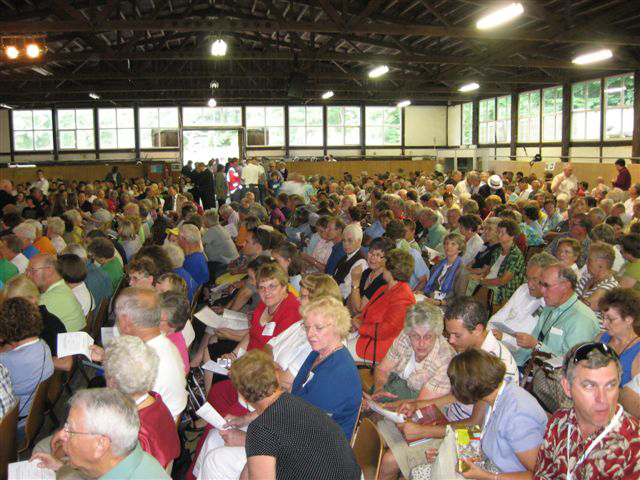 More than 1,000 persons from 18 nations gathered August 2–3, 2008, in Schwarzenau, Germany, where the Brethren movement began in 1708. Hundreds of Brethren from five of the largest Brethren bodies participated in the 300th Anniversary Celebration / 2008 Brethren World Assembly, an event sponsored and implemented through the Brethren Encyclopedia board.During those two days, people came in fourteen tour buses and numerous automobiles to the tiny village of Schwarzenau (population 800) east of Cologne and north of Frankfurt in a bucolic valley in rural Germany. One tour bus brought Grace Brethren leaders from 14 nations. In addition, about 400 German guests participated.
More than 1,000 persons from 18 nations gathered August 2–3, 2008, in Schwarzenau, Germany, where the Brethren movement began in 1708. Hundreds of Brethren from five of the largest Brethren bodies participated in the 300th Anniversary Celebration / 2008 Brethren World Assembly, an event sponsored and implemented through the Brethren Encyclopedia board.During those two days, people came in fourteen tour buses and numerous automobiles to the tiny village of Schwarzenau (population 800) east of Cologne and north of Frankfurt in a bucolic valley in rural Germany. One tour bus brought Grace Brethren leaders from 14 nations. In addition, about 400 German guests participated.This historic celebration was sponsored by the Brethren Encyclopedia Board of Directors with members from the Church of the Brethren, Old German Baptist Brethren Church, The Brethren Church, Dunkard Brethren Church, Fellowship of Grace Brethren Churches, and Conservative Grace Brethren Churches International.
The Brethren movement began in early August 1708 when eight brave souls went to the Eder River where one of them baptized Alexander Mack, who then baptized the others. This beginning occurred at Schwarzenau because Count Henrich Albrecht was tolerant of Pietists and permitted them to gather there to read the Bible and discern for themselves how a follower of Jesus should live and what the nature of a Christian church should be. As Brethren gathered in 2008 to celebrate 300 years of Brethren experience, they also celebrated the tolerance by Count Albrecht which enabled the Brethren movement to begin in the Eder River with adult baptism, an illegal act at that time.
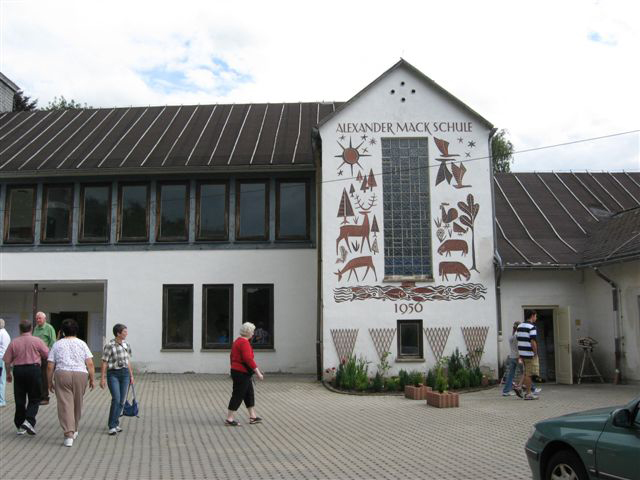 Today, the largest room in the village of Schwarzenau is a Riding Hall that is regularly used to teach horseback riding. The residents of Schwarzenau converted this large room to an auditorium with a wooden floor, a stage, and seating for 1,000 people. In addition to audio amplification, another system broadcast translated speech to persons using a receiver and a headset.
Today, the largest room in the village of Schwarzenau is a Riding Hall that is regularly used to teach horseback riding. The residents of Schwarzenau converted this large room to an auditorium with a wooden floor, a stage, and seating for 1,000 people. In addition to audio amplification, another system broadcast translated speech to persons using a receiver and a headset.Saturday, August 2, was a relaxing day of visiting interesting sites in Schwarzenau and meditating at the Eder River. An Historical Craftsman Market on the grounds of the Manor House provided an introduction to life at the time of the early Brethren. The video By Water and the Word was shown continually in the Riding Hall, and Nevin Dulabaum gave two slide lectures on the background of the Schwarzenau Brethren. At 3:30 there was beautiful Singing for Understanding Between the Nations led by Karl-Heinz Wenzel in the Manor House. Meals were served in a large tent.
Open for visitors were the Alexander Mack Museum, the former Alexander Mack School, the old Schwarzenau mill, and the village church. At the museum, Larry Glick, impersonating Alexander Mack, talked with visitors outside while others were inside viewing the displays. At the former Alexander Mack School, Linda Logan told visitors about the school; panels on the wall portrayed a timeline for the Schwarzenau Brethren and outlined their basic beliefs as set forth by William Willoughby. In another room, the video Food and Clothing, Cattle and Love: Brethren Service after World War II was shown on a continuous basis.
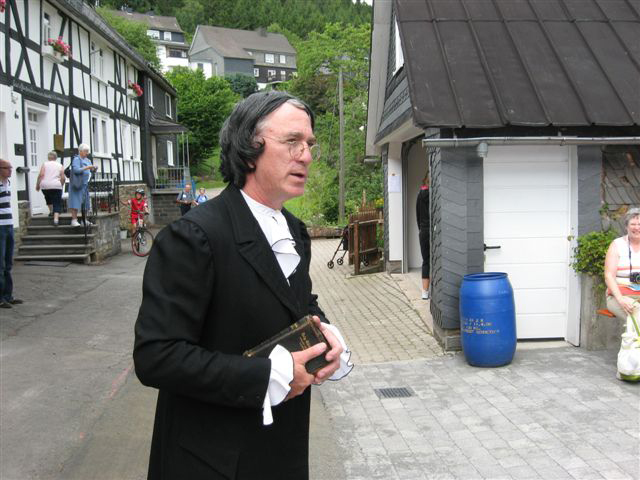
At 4:45 p.m. Saturday, a bronze plaque which had been mounted on the stone wall by the Eder River at the Manor House was unveiled. In both English and German, the plaque expresses appreciation for the tolerance and hospitality of Count Henrich Albrecht toward Pietists in the early 18th century. It also commemorates the 300th anniversary of the beginning the Brethren movement in Schwarzenau/Eder on August 3, 2008, and it lists the participating six Brethren bodies.
In Bad Berleburg, six miles from Schwarzenau, an 18th century castle and a museum housing the eight-volume Berleburg Bible were open to visitors.
Beginning at 7:00 p.m., a concert was given by four choirs: the McPherson College Choir from McPherson College in Kansas; the Gemischter Chor, Schwarzenau; the Frauenchor, Schwarzenau; and the mechor Cantamus, Bad Berleburg.
On Sunday, August 3, a unique worship began at 10 a.m. Dale Stoffer, chair of the Brethren Encyclopedia Planning Committee and Dean of Ashland (Ohio) Theological Seminary, served as worship leader. Fredric M. Miller, Jr., pastor of the Mount Olive Brethren Church (VA) and James M. Beckwith, 2008 Moderator of the Church of the Brethren and pastor of the Annville (PA) congregation, were the preachers.
In the afternoon, the Anniversary Program featured Dr. Marcus Meier, author of The Origin of The Schwarzenau Brethren, as the main speaker. Meier’s book was published in English in 2008 by Brethren Encyclopedia, Inc. Greetings were extended to the Brethren by several German dignitaries. Meier’s address and greetings by the dignitaries were delivered in German with English translation being broadcast in the room for persons using a headset.
The 300th Anniversary Celebration closed with “Gathering at the River” where a meaningful service was led by Michael Miller (Old German Baptist Brethren). The closing doxology and Lord’s Prayer were led by Terry White (Fellowship of Grace Brethren Churches). At that moment, members of five Brethren bodies stood together thinking about the significance of the origin of the Brethren movement.
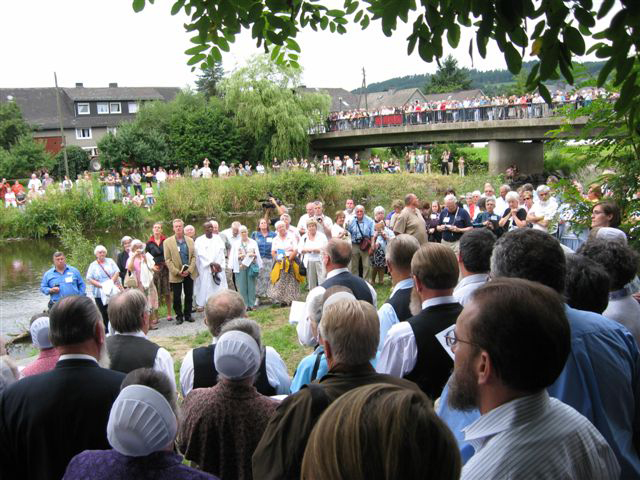 At the end of the day, a number of people were baptized by trine immersion in the Eder River, as Alexander Mack did those 300 years ago. A two-DVD video set recording the 300th anniversary events, titled “Back to Schwarzenau: Celebrating 300 Years of the Brethren Movement” is available elsewhere on this website, as is the monograph “The Origin of the Schwarzenau Brethren” by Marcus Meier, the main speaker for the celebration.
At the end of the day, a number of people were baptized by trine immersion in the Eder River, as Alexander Mack did those 300 years ago. A two-DVD video set recording the 300th anniversary events, titled “Back to Schwarzenau: Celebrating 300 Years of the Brethren Movement” is available elsewhere on this website, as is the monograph “The Origin of the Schwarzenau Brethren” by Marcus Meier, the main speaker for the celebration.
Although not available from Brethren Encyclopedia, an excellent children’s 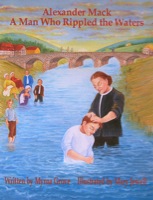 biography of Alexander Mack, entitled Alexander Mack: A Man Who Rippled the Waters, by Myrna Grove, is available. Written for children ages eight through twelve, it describes in simple terms the political and religious conditions Mack experienced both in Europe and in America, and accurately portrays his life and ministry.
biography of Alexander Mack, entitled Alexander Mack: A Man Who Rippled the Waters, by Myrna Grove, is available. Written for children ages eight through twelve, it describes in simple terms the political and religious conditions Mack experienced both in Europe and in America, and accurately portrays his life and ministry.

